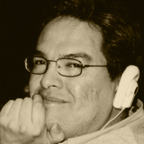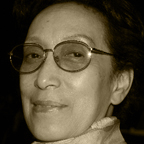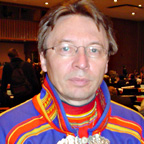 24 April 2008 MEDIA PERSPECTIVES 6th & 7th Meetings SEVENTH SESSION UN PERMANENT FORUM ON INDIGENOUS ISSUES OFFICIAL WEB SITE LISTEN TO DAILY AUDIO BROADCASTS OF THE 7TH SESSION OF THE UN PERMANENT FORUM 24 April 2008
The dbn.tv team in Canada and Spain wishes to thank the UN Audio Library and the Recording Room for their collaboration in making these sessions available around the world UN NEWS SERVICE - INDIGENOUS PEOPLES UN PRESS RELEASES AND MEDIA COVERAGE Economic and Social Council
PERMANENT FORUM SPEAKERS SAY VIOLATION OF
LANGUAGE RIGHTS Language rights should be implemented as a
collective and individual right since they were integral to
self-determination, a member of the Permanent Forum on Indigenous
Issues said today during a half-day debate devoted to indigenous
languages. The Permanent Forum on Indigenous Issues
continued its seventh annual session today, with a focus on: climate
change; implementation of recommendations on the six mandated areas
of the Permanent Forum and on the Millennium Development Goals
(economic and social development, environment, health, education,
culture and human rights); and indigenous languages.
PANELISTS
Mr. BAER said Governments tended to be highly unaware of the effects had by the loss of language -- indigenous languages were a vessel of traditional knowledge on biological diversity, for example. Many did little to reverse the trend. He noted that 2008 was the International Year of Languages, and that the Permanent Forum had recommended that the Economic and Social Council convene an expert meeting on indigenous languages in preparation for it. That meeting took place from 21 April to 2 May 2007. On 10 January, it adopted conclusions and recommendations (document E/C.19/2008/3 ), in which it suggested that language rights be implemented as a collective and individual right, since they were integral to self-determination.
Lourdes Tiban Ms. TIBAN said measures were being taken in her country to ensure that education in indigenous languages was made available. Many criticized the dual language system, but language accounted for the richness of culture. The right to use one's indigenous language had been incorporated into the 1994 Constitution of Ecuador, yet very few had exercised their right to avail themselves of the resources to do so. There were few indigenously speaking attorneys capable of representing indigenous peoples as a result. The thinking about indigenous practices, lifestyles and language needed to change. For example, Quechua was considered a backward language, but in actuality it took a very intelligent person to speak it.
Rochelle Roca-Hachem Ms. ROCA-HACHEM said she was pleased that the discussion on language was
taking place during the 2008 Year of Languages, because languages
had been gaining in importance throughout the world in the past few
years and concern for linguistic diversity and multilingualism was
growing. "Languages are a vehicle of knowledge, a tool for
communication and inclusion, and an expression of identity and
diversity", she said. Important statements and standard-setting
instruments had testified to a growing awareness of the importance
of language at the international level. Richard Grounds Mr. GROUNDS took the floor to deliver a greeting in the Euchee language, which he later translated to mean "Languages were gifts from the Creator. The Euchee would exist so long as the language was alive". He then explained that the Euchee language was now only spoken by five people in the world, as was the case with many other Native American languages. The New York Times and US News and World Report showed that Oklahoma, where the Euchee people lived, was one of the places on the planet where languages were disappearing at a fast rate.
Anna Lucia D'emilio Ms. D'EMILIO noted that, before ILO Convention 169 and the Declaration on the Rights of Indigenous Peoples came into being, there existed the Convention on the Rights of the Child, which had been ratified by almost all countries. That Convention contained a provision saying that no indigenous child could be denied the right to his or her language and culture. By that provision, no one could prevent the right of children to use English in the United States, say, or Italian in Italy. However, from UNICEF's standpoint, the exercise of that right could not be conditioned by the number of speakers of a given language. Therefore, it was working with small communities whose language was in danger of becoming extinct
An unprecedented 3,300 indigenous people have
gathered this week at UN headquarters in New York to participate in
a two week meeting of the Permanent Forum on Indigenous Issues. |
|
Intro 2008 Opening 1st & 2nd Meetings | 3rd and 4th Meetings | 5th Meeting | 6th and 7th Meetings | 8th and 9th Meetings Kari-Oca Revisited |
dbn@dialoguebetweennations.com
Copyright Natalie Drache 1999




